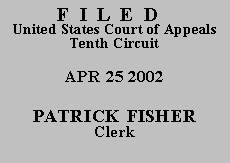

| JAMES ARLEN CHILDS,
v.
JUANITA ORNELAS NOVAK;
RANDY FOSHEE; BECKY
ROMANO |
No. 01-1502
(D.C. No. 01-Z-1316) (D. Colo.) |
The Plaintiff-Appellant, James Arlen Childs, is currently serving a prison term at the Colorado State Penitentiary in Canon City, Colorado. On December 5, 2000, prison officials placed Childs in temporary punitive segregation pending a hearing to determine whether Childs should be placed in administrative segregation. On that same day, prison officials tendered Childs with notice informing him that they were considering placing him in administrative segregation because he had "continued his victimization of female staff" and because a mental health coordinator had concluded that his behavior was "increasingly more dangerous, placing the safety of female staff at risk." Aplt. Br. at 17. Three days later, on December 8, 2000, officials held the hearing and concluded that Childs should be placed in administrative segregation in a maximum security facility. A few days after the hearing, officials provided Childs with a document stating that he was being placed in administrative segregation because they believed that his conduct posed "a serious threat to security of a facility" and that segregation was necessary "to prevent imminent injury to an inmate(s) or to an employee(s)." Complaint ¶¶ 26-27.
In July 2001, Childs brought a civil rights suit under 42 U.S.C. § 1983 and 28 U.S.C. § 1343(a)(2) against the Defendants-Appellants, various officers and officials in the state prison, in which he argued that his temporary punitive segregation and subsequent administrative segregation violated his Due Process rights under the Fifth and Fourteenth Amendments of the United States Constitution. Among other reasons, Childs charged prison officials with violating his Due Process rights (1) by placing him in temporary segregation before holding a hearing, Aplt. Br. at 18a-19,(1) (2) by serving him with notice that did not identify the specific factual claims against him prior to the segregation hearing, thereby denying him "a chance to marshal the facts in his defense and to clarify what the charges [were]," id. at 18a, (3) by not allowing him to present evidence or call witnesses during the segregation hearing, id. at 19b, (4) by not adequately explaining the factual circumstances justifying the hearing board's decision to place him in administrative segregation, id., and (5) by relying upon false evidence during the segregation hearing. Id. Many of Childs's claims relied upon the prison officials' alleged failure to comply with Colorado Department of Corrections regulations for disciplining inmates, see, e.g., Complaint ¶¶ 32,35, 40-48, 67-68, 73-74, 76, 79, and the Supreme Court's opinions in Hewitt v. Helms, 459 U.S. 460 (1983), and Wolff v. McDonnell, 418 U.S. 539 (1974). The district court, invoking the Supreme Court's decision in Sandin v. Conner, 515 U.S. 472 (1995), dismissed Childs's complaint as legally frivolous under 28 U.S.C. § 1915(e)(2)(B). This appeal followed.
Having carefully reviewed the record, as well as the case law cited by Childs, we, like the district court, conclude that Childs's claims are barred under Sandin. Therefore, we AFFIRM the dismissal of Childs's suit as legally frivolous for substantially those grounds identified in the district court's order and judgment. Further, we DENY Child's Motion for Leave to Proceed on Appeal Without Prepayment of Costs or Fees and order him to pay costs and fees associated with this appeal within ten days.
ENTERED FOR THE COURT
David M. Ebel
Circuit Judge
*.After examining appellant's brief and the appellate record, this panel has determined unanimously that oral argument would not materially assist the determination of this appeal. See Fed. R. App. P. 34(a)(2) and 10th Cir. R. 34.1(G). The case is therefore ordered submitted without oral argument. This Order and Judgment is not binding precedent, except under the doctrines of law of the case, res judicata, and collateral estoppel. The court generally disfavors the citation of orders and judgments; nevertheless, an order and judgment may be cited under the terms and conditions of 10th Cir. R. 36.3.
1.Childs's pro-se brief contains a page 18 and an "Additional Page 18," as well as a page 19 and two pages labeled "Additional Page 19." We have elected to identify these additional pages by placing a letter after their respective page numbers. Thus, we refer to the additional pages as 18a, 19a, and 19b, respectively. Childs has also submitted a letter asking this court to examine Colorado's Code of Penal Discipline Handbook in reviewing his appeal. We construe this as a motion to supplement the record on appeal and we deny that motion.